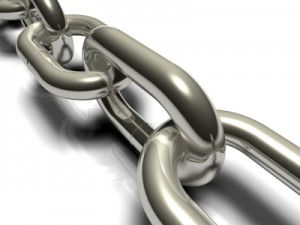Updated: February 28, 2019

Aside from including unique, high-quality, relevant content on an easily crawlable website, link building is perhaps the most important task for building high search engine rankings. In the beginning, you may have to obtain links from sites that have absolutely nothing to do with what you’re about. Or, you may have to get links from sites that aren’t very trustworthy.
While this isn’t necessarily your first choice, obtaining links from these kinds of sites certainly won’t hurt your search rankings – they may even help a little bit in fact.
Generally speaking, incoming links (other sites linking to yours) will not get you in trouble. However, outgoing links (you linking to others) can get you in a heap of trouble if they’re not done properly. Linking to sites that have been penalized by Google could result in you getting a penalty.
Before getting into a link-swap with another site, you should consider the following three steps to ensure your site doesn’t get penalized through a bad outgoing link.
1. Search for the site’s domain name in major search engines
If the site in question isn’t listed in Google, Yahoo or Bing, you should stay away from it. If the site is banned, linking to it could lead to your site being banned. But even if the site in question isn’t ‘bad’ in terms of the search engines, linking to a site search engines don’t know about won’t net you any benefit. Therefore, if you can’t find the site in Google, etc., don’t link to it.
2. Find out who else is linking to them
If you’re thinking about linking to another site, you also need to consider who else is linking to them. One tool from Search Engine Guide (Site Strength Indicator) can help you easily determine who’s linking to the site you’re looking at.
Sites with a high number of incoming links will benefit you more if you can get a link from them.
Also, the importance of the other sites linking to the site you’re looking at makes a difference as well. PageRank is one metric Google uses to determine a site’s importance. Those with a higher PageRank will yield more benefit to you.
Whatever you do, do not link to a site with a PageRank of zero. Either the site was penalized or it’s too new to have any PageRank value.
3. Avoid linking to sites that are controversial
Linking to a site that includes what Google considers controversial topics (i.e. gambling, adult, pharmacy, loan/debt sites) will also get you in trouble with the search engines. That’s why it’s important you carefully evaluate each site you consider linking to. Unless you’re in the same industry, Google will penalize you for linking to another site with controversial topics.
Remember, you probably will not be penalized for sites linking to you. But if you link to a site that’s not trustworthy or has been penalized a lot, your rankings and standings in the search engines are likely to suffer.
Related Posts
8 SEO Tricks You Do NOT Want to Use – Avoiding the Google Penalty Box (Part I, Part II)
